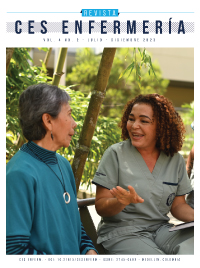Mental health and spirituality: nursing approach from the recovery of people with suicidal behavior
DOI:
https://doi.org/10.21615/cesenferm.7260Keywords:
mental health, spirituality, nursing care, suicidal behaviorAbstract
Spirituality as a support in the recovery processes when a mental health problem arises, has been recognized not only for its contribution to the well-being of the person who presents the problematic situation, but also for the role it plays in the tranquility of its family nucleus and caregivers. The objective of this text is to recognize nursing interventions (NICs), based on Leamy's CHIME Mental Health Recovery model (Connectness/Connections, Hope/Hope, Identity/Identity, Meaning/Meaning and Empowerment/Empowerment), which can be developed to favor the recovery of people who present suicidal behavior. The descriptors hope, identity, spiritual, transcendence, suicide, self-knowledge and empowerment were used. We found 6 interventions and among them 49 activities that can support the recovery of a person with suicidal behavior. It can be concluded that through the CHIME Recovery Model, actions articulated with the classification of nursing interventions (NIC) can be developed, useful in the therapeutic process of people who have presented suicidal behavior.
Downloads
References
Instituto Nacional de Salud. Intento de suicidio. Reporte 2020. Bogotá, Colombia; 2020.
Killgore WDS, Cloonan SA, Taylor EC, Fernandez F, Grandner MA, Dailey NS. Suicidal ideation during the COVID-19 pandemic: The role of insomnia. Psychiatry Research. 2020. Doi: 10.1016/j.psychres.2020.113134.
Iob E, Steptoe A, Fancourt D. Abuse, self-harm and suicidal ideation in the UK during the COVID-19 pandemic. Br J Psychiatry. 2020. Doi: 10.1192/bjp.2020.130.
Yang Y, Li W, Zhang Q, Zhang L, Cheung T, Xiang YT. Mental health services for older adults in China during the COVID-19 outbreak. The Lancet Psychiatry. 2020;7(4):e19. Available in: https://www.thelancet.com/journals/lanpsy/article/PIIS2215-0366(20)30079-1/fulltext
Cui LB, Wang XH, Wang HN. Challenges of facing coronavirus disease 2019: Psychiatric services for patients with mental disorders. Psychiatry Clin Neurosci. 2020;(March):13–4. Available in: https://onlinelibrary.wiley.com/doi/full/10.1111/pcn.13003
Organización Mundial de la Salud. Prevención del suicidio. Un imperativo global: Epidemiología mundial del suicidio y de los intentos de suicidio. Organ Mund la Salud. 2014. Disponible en: https://iris.paho.org/bitstream/handle/10665.2/54141/9789275318508_spa.pdf?sequence=1&isAllowed=y
Davidson CL, Wingate LR, Rasmussen KA, Slish ML. Hope as a Predictor of Interpersonal Suicide Risk. Suicide Life-Threatening Behav. 2009. https://onlinelibrary.wiley.com/doi/10.1521/suli.2009.39.5.499
Arenas A, Gómez-Restrepo C, Rondón M. Factores asociados a la conducta suicida en Colombia. Resultados de la Encuesta Nacional de Salud Mental 2015. Rev Colomb Psiquiatr. 2016;45(S 1):68–75. Disponible en: http://www.scielo.org.co/scielo.php?script=sci_arttext&pid=S0034-74502016000500010
Mars TS, Abbey H. Mindfulness meditation practise as a healthcare intervention: A systematic review. Int J Osteopath Med. 2010;13(2):56–66. Available in: https://www.sciencedirect.com/science/article/abs/pii/S1746068909000704
Hayes D, Moore A, Stapley E, Humphrey N, Mansfield R, Santos J, et al. Promoting mental health and wellbeing in schools: examining Mindfulness, Relaxation and Strategies for Safety and Wellbeing in English primary and secondary schools: study protocol for a multi-school, cluster randomised controlled trial (INSPIRE). Trials. 2019;20(1). Available in: https://trialsjournal.biomedcentral.com/articles/10.1186/s13063-019-3762-0
Snow L a, Hovanec L, Brandt J. A controlled trial of aromatherapy for agitation in nursing home patients with dementia. J Altern Complement Med. 2004;10(3):431–7.
Eva M. Vulnerabilidad, ruptura social y arteterapia. Arteterapia Papeles arteterapia y Educ artística para la inclusión Soc. 2018;13:1–15.
Lin ST, Yang P, Lai CY, Su YY, Yeh YC, Huang MF, et al. Mental health implications of music: Insight from neuroscientific and clinical studies. Harv Rev Psychiatry. 2011;
Gorn SB, Navarro SA, Solano NS. El uso de las terapias alternativas y complementarias en población mexicana con trastornos depresivos y de ansiedad: Resultados de una encuesta en la ciudad de México. Salud Ment. 2009. Disponible en: https://www.scielo.org.mx/scielo.php?script=sci_arttext&pid=S0185-33252009000200003
Collinge W, Wentworth R, Sabo S. Integrating complementary therapies into community mental health practice: An exploration. J Altern Complement Med. 2005; Available in: https://www.liebertpub.com/doi/10.1089/acm.2005.11.569?url_ver=Z39.88-2003&rfr_id=ori%3Arid%3Acrossref.org&rfr_dat=cr_pub++0pubmed
Grupo Centro de Referencia Nacional sobre Violencia (GCRNV). Instituto Nacional de Medicina Legal y Ciencias Forenses Forensis. Forensis 2018. Datos para la vida. 2018.
Sarabia Silvana. Suicidio: un problema de salud pública. Rev Neuropsiquiatr. 2014;77(4):199–200.
Pineda Roa CA. Factores asociados con riesgo de suicidio de adolescentes y jóvenes autoidentificados como lesbianas, gays y bisexuales: estado actual de la literatura. Rev Colomb Psiquiatr. 2013 Dec 1;42(4):333–49.
Ferrari AJ, Norman RE, Freedman G, Baxter AJ, Pirkis JE, Harris MG, et al. The burden attributable to mental and substance use disorders as risk factors for suicide: Findings from the Global Burden of Disease Study 2010. PLoS One. 2014. Available in: https://www.ncbi.nlm.nih.gov/pmc/articles/PMC3973668/
Gómez-Durán EL, Martin-Fumadó C, Hurtado-Ruíz G, Gomez- Durán E, Martin- Fumadó C, Hurtado-Ruiz G. Aspectos clínico-epidemiológicos del suicidio consumado en pacientes con esquizofrenia. Actas Esp Psiquiatr. 2012;40(6).
Quiceno JM, Vinaccia S. La salud en el marco de la psicología de la religión y la espiritualidad. Divers Perspect en Psicol. 2009;5(2):321–36.
Chaudhry HR. Psychiatric care in Asia: spirituality and religious connotations. Int Rev psychiatry. 2008;20(5):477–83.
Soto Morales AM, Olivella Fernandez MC, Bastidas Sanchez CV. Cuidado espiritual al adulto mayor, elemento del conocimiento y práctica de enfermería. Rev Cienc y Cuid. 2020;17(1):123–31.
Dilmaghani M. Importance of Religion or Spirituality and Mental Health in Canada. J Relig Health [Internet]. 2018 Feb 18;57(1):120–35.
Rosmarin DH, Alper DA, Pargament KI. Religion, Spirituality, and Mental Health. In: Encyclopedia of Mental Health. Elsevier; 2016. p. 23–7.
Rickhi B, Kania-Richmond A, Moritz S, Cohen J, Paccagnan P, Dennis C, et al. Evaluation of a spirituality informed e-mental health tool as an intervention for major depressive disorder in adolescents and young adults - a randomized controlled pilot trial. BMC Complement Altern Med. 2015;15(1):1–15.
Ho RTH, Chan CKP, Lo PHY, Wong PH, Chan CLW, Leung PPY, et al. Understandings of spirituality and its role in illness recovery in persons with schizophrenia and mental-health professionals: A qualitative study. BMC Psychiatry. 2016 Apr 2;16(1).
Wachholtz AB, Pargament KI. Is spirituality a critical ingredient of meditation? Comparing the effects of spiritual meditation, secular meditation, and relaxation on spiritual, psychological, cardiac, and pain outcomes. J Behav Med. 2005. Doi: 10.1007/s10865-005-9008-5.
Sanchez-Herrera B. The Spiritual Wellbeing of Persons with and without a Disability. Aquichan. 2009;9(1):8–22.
Sanchez-Herrera B. Dimensión espiritual del cuidado en situaciones de cronicidad y muerte. Surgen luces de esperanza para acoger mejor el reto de la totalidad, tras años de investigación en enfermería. Aquichan. 2004;4(4):6–9.
Parra R. Modelo de recuperación en Salud Mental: ¿es posible en Chile? LIMINALES Escritos sobre Psicol y Soc. 2019;3(15):65–79.
Galvis López MA, Pérez Giraldo B. Revisión de la literatura sobre el concepto “Espiritualidad” aplicado a la práctica de enfermería. Rev Iberoam Educ e Investig en Enfermería. 2013;3(3):54–61.
Le Boutillier C, Leamy M, Bird VJ, Davidson L, Williams J, Slade M. What does recovery mean in practice? A qualitative analysis of international recovery-oriented practice guidance. Psychiatr Serv. 2011;62(12):1470-1476 7p.
Neathery M, He Z, Taylor EJ, Deal B. Spiritual Perspectives, Spiritual Care, and Knowledge of Recovery Among Psychiatric Mental Health Nurses. J Am Psychiatr Nurses Assoc. 2019. Available in: https://journals.sagepub.com/doi/10.1177/1078390319846548
Camann MA. The psychiatric nurse’s role in application of recovery and decision-making models to integrate health behaviors in the recovery process. Issues Ment Health Nurs. 2010;31(8):532–6.
Rosillo Herrero M, Hernández Monsalve M, Smith SPK. La recuperación: servicios que ponen a las personas en primer lugar. Rev la Asoc Española Neuropsiquiatría. 2013 Jun;33(118):257–71.
Downloads
Published
How to Cite
Issue
Section
License
Copyright (c) 2023 CES Enfermería

This work is licensed under a Creative Commons Attribution-NonCommercial-ShareAlike 4.0 International License.



